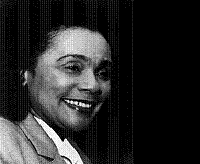Coretta Scott King is buried near her husband
At the center she started to promote her husband's dream, Coretta Scott King's body was placed in a tomb near her husband's between them, an eternal flame burns as it has for decades. The private interment Tuesday evening ended a day when four U.S. presidents and more than 30 other speakers at her funeral took turns saluting "the first lady of the civil rights movement" for her efforts over 40 years to realize her husband, Martin Luther King Jr.'s dream of racial equality.

They joined 10,000 other mourners including numerous members of Congress and many gray-haired veterans of the struggle for civil rights to say goodbye to King's widow, who died Jan. 30 at age 78 after battling ovarian cancer and the effects of a stroke.
The immense crowd filled the New Birth Missionary Baptist Church a modern, arena-style megachurch in a suburban Atlanta county that was once a stronghold of the Ku Klux Klan but today has one of the most affluent black populations in the country.
President George W. Bush ordered flags flown at half-staff across the country and saluted Coretta Scott King as "a woman who worked to make our nation whole."
Following the six-hour funeral, about 300 people followed the hearse carrying King's coffin on the 15-mile (24-kilometer) trip to the King Center near downtown Atlanta . With the four King children standing nearby, six white doves were released before Coretta Scott King's coffin was placed in her tomb, inscribed with a passage from First Corinthians: "And now abide Faith, Hope, Love, These Three; but the greatest of these is Love."
Immediately, about 100 onlookers started lining up to place flowers on her tomb.
"One of the greats has passed on. And she has passed the torch back to everyone of us," said Craig Hickerson, 28, of Atlanta , who attended the internment.
The nighttime ceremony was much smaller and attracted much less attention than the funeral, where Bush told the crowd: "Coretta Scott King not only secured her husband's legacy, she built her own. Having loved a leader, she became a leader, and when she spoke, Americans listened closely."
Former President Bill Clinton urged mourners to follow in her footsteps, honor her husband's sacrifice and help the couple's children fulfill their parents' legacy. Former President George H.W. Bush said the "world is a kinder and gentler place because of Coretta Scott King." Former President Jimmy Carter praised the Kings for their ability to "wage a fierce struggle for freedom and justice and to do it peacefully."
The funeral at times turned political, with some speakers decrying the war in Iraq , the Bush administration's eavesdropping program, and the sluggish response to Hurricane Katrina in mostly black New Orleans .
The Rev. Joseph Lowery, who co-founded the Southern Christian Leadership Conference with Martin Luther King Jr., drew a roaring standing ovation when he said: "For war, billions more, but no more for the poor" a takeoff on a line from a StevieWonder song. The comment drew head shakes from Bush and his father as they sat behind the pulpit.
The lavish service stood in sharp contrast to the 1968 funeral for King's husband. Former President Lyndon B. Johnson did not attend those services, which were held in the much smaller and older Ebenezer Church in Atlanta , where King had preached.
In the days leading up to the funeral, more than 160,000 mourners waited in long lines to pay their respects and file past King's open casket during viewings at churches and the Georgia Capitol, where King became the first woman and the first black person to lie in honor.
Stevie Wonder and Michael Bolton sang, giving soaring, gospel-infused performances. At least 14 U.S. senators attended, along with members of the House.
Among the civil rights veterans at the funeral were Dorothy Height, longtime chairwoman of the National Council of Negro Women; Rep. John Lewis, former head of the Student Nonviolent Coordinating Committee who led the "Bloody Sunday" march in Selma , Alabama ; and the Rev. Jesse Jackson, founder of the Rainbow/PUSH Coalition.
The youngest of the Kings' four children, Bernice, delivered remarks that were part fiery sermon and part eulogy. She was 5 when her father was assassinated, and was famously photographed lying in her mother's lap during her father's funeral.
Bernice King, a minister at the megachurch, yelled at times as she preached against violence and materialism, saying that her mother's purpose in life was to spread her father's message of peace and unconditional love.
"Thank you, mother, for your incredible example of Christ-like love and obedience," she said.
Poet Maya Angelou called Coretta Scott King "a study in serenity" and challenged the audience to carry on the King message of nonviolence.
"We owe something from this minute on, so that this gathering is not just another footnote on the pages of history," said Angelou, a former U.S. poet laureate who sang some of her comments in a traditional style of the Southern black church.
Atlanta Mayor Shirley Franklin injected politics into her remarks, describing how Coretta Scott King spoke out against "the senselessness of war" with a voice that was heard "from the tintop roofs of Soweto to the bomb shelters of Baghdad ."
Carter brought up the government response to Katrina, saying, "We only have to recall the color of the faces of those in Louisiana , Alabama and Mississippi " to know that inequality exists. He also noted that the Kings once were "victims of secret government wiretapping" echoing Bush's domestic spying program.
Outside the church, the lines to get into the funeral and to attend the final viewing of King's body started forming before 3 a.m.
"It's good to finally see her at peace," said Robert Jackson, a 34-year-old financial consultant from Atlanta whose 10-year-old daughter, Ebony, persuaded him to take her to the church, reports the AP.
D.M.
Subscribe to Pravda.Ru Telegram channel, Facebook, RSS!





